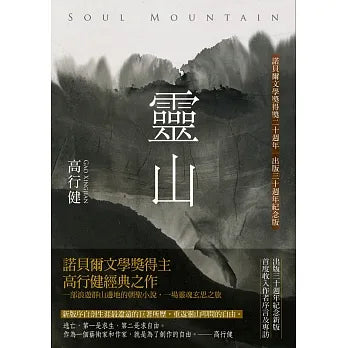諾貝爾文學獎得主高行健經典之作一部浪遊群山邊地的朝聖小說,一場靈魂玄思之旅出版三十週年紀念新版
★首度收入作者序言及專訪★
自剖生涯最遼遠的巨著所歷,叩問的自由。
Page
──高行健
《靈山》出版三十週年,這部高行健回顧創作生涯「最大的作品」,不僅寫作歷時最長,自中國寫到法國,小說也記述下作者八○年代浪跡長江流域,前去青藏高原、四川貴州,於蠻山惡水間逾萬公里的所歷所聞。
小說主人翁遭遇誤診肺癌的事變後,離開了北京,沿江水漫遊上溯,途中無意聽聞「靈山」之名,繫念而來到尋山入口的烏伊小鎮。生命的顛躓跋涉因此帶著朝聖旅程的意涵。表面上藉作家身分走訪鄉里、收集歌謠,拜會歌師、祭司,深入少數民族藏、羌、苗人猶流傳著巫術與奇談的大地,邂逅另個女子;實則在人稱代名詞「我」、「你」與「她」的觀點交錯間,展開一場內在哲思之旅。
敘事者如此自陳:「這漫長的獨白中,一個傾聽我的我自己,你既混融了戲劇口語等嶄新的美學如高行健所說「打開通往人的意識和潛意識的通道」、「人稱就是通道」,藉語言藝術的實踐,各角度切近敘事者心靈自由的風景。
瑞典皇家學院的頌辭表示:「《靈山》不但是一部敘述主人公旅程的朝聖小說,也代表一個反思的過程,這條反思之路的兩邊,分別是虛構與真實人生、幻想與記憶。而探討知識問題的形式是漸行漸深,以擺脫目的和意義。」
各界推薦
恰如書名《靈山》,真是一部令人暈眩的小說,勇敢無畏的高行健剛寫出了一部最令人困惑的小說:一位元元天行者的指南, 隨風飄逸,真讓人著迷!──《快報》,安德勒‧克拉維爾(André Clavel)
這當然是一部小說,一部從自然到人生全面的大作。九十年代幾乎壞死的中國文學世界報》,阿蘭‧貝羅博(Alain Peyrobe)
人們將會明白:高行健建構的並非一部懷舊之作,而是一座靈魂之山的藝術!要知道他如Jacques Decornoy)
這部迷人的書乃是一位畫家、詩人和哲學家之作:恰如一個奇妙的萬花筒,將一個永恆的中國,殘酷有時絕妙又破碎,在毀滅與新生的中國呈現出來。他花了七年時間致力於這部美妙的攀高旅程,從以及少數民族先前的歌謠和暴力冷酷的新風氣,不斷網織,形成奇特的對比。總而言之,構成一部人類的縮影。──《瑪爾格利(Diane by Margerie)
歷史或政治層面只不過是這部多種形態的書的表層,它時而以一種流浪漢小說的姿態,時而如夢,時而如同抒情詩。誠如作者所言,此乃一部所謂東方小說,把寓言、遊記、神話一概包含在內。──《解放報》,Gérard Meudal(惹哈爾‧莫達爾)
這部絕妙的書,詩意的年譜,將歷史軼事、民間故事、文學研究、哲學思考和愛情糾葛輪流穿插Jean-Luc Douin)
這可不是一部簡單的小說,《靈山》乃是精神之旅。──《馬賽日報》,若斯伐‧馬爾提內(Jose fa Martinez)
